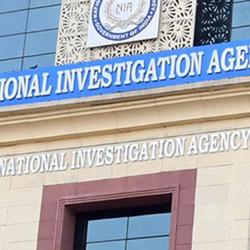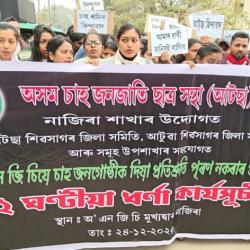Finally Assam government has bowed down to the growing public outrages. Following intense public pressure, the province government of Northeast India, has favoured for a CBI probe into the cases of rhino poaching at different preserves in the state. The state chief minister Tarun Gogoi on May 2 declared that following demands from various socio-environment organizations, the government has decided to go for a Central Bureau of Investigation inquiry into the killing of over 30 rhinos in Assam since January 2007.
The civil societies and the advocacy groups of the region had rigorously raised voices against the slaughtering of endangered one horn rhinos by poachers since the early part of 2008. But surprisingly enough, the concerned authority and the state government preferred to overlook the public resentment. For more than three months, the wildlife lovers have strongly condemned the authority of Kaziranga National Park (KNP), which had witnessed the loss of 26 rhinos to poachers since January 2007. But neither the authority nor the government had shown the moral courage to admit their incompetence in protecting the inmates of the celebrated park.
The last week of April witnessed the slaughtering of two more rhinos in Kaziranga. The forest guards discovered the bodies of the rhinos, one of them was a calf, inside the park, but the horns were already chopped off. Even the tigers feasted half of the bodies of the rhino calf, when the forest guards witnessed them. It has added the list of rhinos, fallen prey to poachers at KNP, up to six in this year.
Recognized as a safe heaven for the rhinos, Kaziranga gives shelter to almost two-thirds of the total population of one-horned rhinos on Earth. A 1984 census showed that Kaziranga, which was declared a National Park in 1974, had 1,080 rhinos. The toll increased during 1975 to 1990, nearly 25 per year. The statistics showed that rhino population was found 1069 in another census during 1991. The census in 1999 provided more optimistic result as the number of rhinos soared to 1,552. The last census in 2006 revealed the number of rhinos in the park at 1,855.
The rhino horn enjoys great demand in international market as it is considered to contain aphrodisiac qualities. The heavy animal enjoys great sexual power, as its mating time is not less than 45 minutes (quite higher than any other animal). Many people believe that one can achieve the sexual power with the help of rhino horns. They consider the rhino horns as another kind of traditional viagra. The horns are also believed to have medicinal values. The traditional Chinese medicine demands rhino horns, which is believed to cure fever and stomach ailments fast. China, Taiwan, Thailand, South Korea and the Middle East are known to be huge markets for illegal trading of rhino horns. It fetches a few thousand US dollars per kilogram of horn in the international market.
The park director Suren Buragohain remained clueless at the increasing incidents of poaching of rhinos and only parroted his earlier version, "The poachers are equipped with sophisticated weapons. But our forest guards lack the proper arms to counter them." However, Mr. Buragohain has earned brickbats from wildlife advocates as the recent increase in rhino poaching has occurred during his tenure. Statistics reveal that during his term of around a year, Kazirnaga lost the highest number of rhinos in a decade.
If the director was oblivious to the grave threats to rhino poaching in Kaziranga, the Assam forest minister showed equally insensitive and callous approach to the issue. All the time, the young minister in Tarun Gogoi's state cabinet, preferred to ignore the matter. It finally compelled the students union, environmental activists, journalists' organizations and political leaders to adopt the path of demonstration against the minister.
It started with Nature's Beckon, an active environment NGO of the region, which staged a protest rally on October 1 last year against the authority for its failure to manage the forest and wildlife of Assam. The concern for the rhinos was visible in media through the editorials and the letters to the editor columns. Concerned ordinary citizens and the opposition political parties also expressed their deep anguish against the continued poaching of rhinos in Assam, particularly in Kaziranga.
Soon the activists belonged to All Assam Students Union (AASU), an influential students body of Northeast, staged demonstrations throughout Assam on February 2, protesting against the authority's failure to protect the rhinos. The venues included the offices of the forest departments in all parts of Assam. The AASU advisor Samujjal Bhattacharya, an aggressive student leader, demanded the resignation of Rockybul Hussain, the forest minister of Assam 'for failing to take adequate steps to stop this heinous crime against a national treasure'.
Lately, the AASU activists organized a citizens' meet at Kohora near the Kaziranga Park, to hammer on the authority on its failure to protect the rhinos. The daylong meet on February 24, which was attended by various pressure groups, resolved to emphasize on a high level probe to catch the real perpetrators behind rhino poaching.
Various speakers in the crowded meeting, which was inaugurated by an eminent Assamese author Arup Kumar Dutta with the children novel 'The Kaziranga Trail' fame, highlighted the demand for a special task force, equipped with modern weapons for protection of flora and fauna, an annual census of rhinos and a citizen monitoring committee involving the indigenous people to keep an eye on the wildlife. The state forest minister was accused of non-performance by most of the speakers and the chief minister of Assam, Tarun Gogoi was also targeted by them for his lingering silence on the issue only to safeguard his ministerial college.
Shocking revelation is however made by the director of Nature's Beckon. Talking to this writer, Soumyadeep Datta claimed that the forest department of Assam was itself involved with the illegal trade of rhino horns. "We have authentic information that Assam forest department had sold more than 300 rhino horns even after India adopted the wildlife protection act in 1972. We can give the relevant statistics of the sold rhino horns in details as 29 (during 1971-72), 13 (1972-73), 19 (1973-74), 40 (1974-75), 18 (1975-76), 27 (1976-78), 42 (1977-78), 63 (1978-79), 63 (1978-79), 61 (1979-80)," Mr Datta revealed.
In fact, the young activist came out with such an apprehension more than two months back. Addressing the media persons at Guwahati press club on February 4, Mr. Datta commented, "We suspect that a large share of the wildlife parts, which are being sold in the international markets, made way from the forest department's stock due to the manipulation and corrupt practices of some dishonest forest officials."
So we want to a probe (preferably by Central Bureau of Investigation) on the stock of animal parts in the custody of Assam forest department, as it is assumed that some precious parts of rhinos, elephants, tigers and leopards had gone for international markets from the official stock of the department, Mr. Datta insisted.
In India, poaching is a punishable offence with up to seven years' imprisonment. India has been a member to the Convention on International Trade in Endangered Species since 1976 and hence, in principle at least, is bound by all its efforts to eliminate International trade in wildlife and wildlife parts, he added.
As the controversy gained momentum, one rhino was slaughtered at Kaziranga on February 5, which created a huge public uproar throughout the region. Under pressure, the forest minister Mr. Hussain rushed to Kaziranga and ordered to deploy additional 100 armed guards in the park. Compelled by the situation, the minister even disclosed that he had no reservation against a CBI enquiry into the entire issue of poaching at the Nation al parks of Assam.
The demand for a CBI probe into the killings of rhinos was also highlighted during a Nagorik Sobha (citizens' meet), which was organized by a local journalist group. The Journalists' Forum, Assam, during its meeting on February 13 urged the state chief minister 'to break his silence on the issue and let the people know his government's stand and the steps he has taken, if any, to stop the menace'. In one of its resolutions, the meeting asserted that the incumbent forest minister had miserably failed to protect the rhinos and prevent their poaching and hence no longer he remained 'fit for the job'.
The concern for the rhinos was also expressed by a group of non-resident Assamese (Indian), who joined the chorus to save the rhinos. The Friends of Assam & Seven Sisters (FASS), in a recent statement, supported the demand for a credible and high level enquiry into the ongoing killings of the precious animals.
"We think volumes have been written and spoken about the ineffectiveness of the present measures to protect the rhinos in KNP and other sites. Now it is time to act. We urge for an immediate CBI investigation into the ongoing killings of rhinos, and take disciplinary actions against the officials and individuals responsible for the lack of protective actions," commented Rajen Barua, CMD of FASS stated. Speaking to this writer from New York, Mr. Barua added, "Since the state government has failed miserably in its duties, the administration of the KNP should immediately be placed under military rule for the time being with strict orders to treat the poachers as terrorists. More over, a citizen's vigilance committee should be formed to monitor the situation on a regular basis in the national parks."
Concerned ordinary citizens, political party members, and media in general have all expressed their deep anguish against the continued slaughtering of rhinos in Assam, particularly at Kaziranga. The newspaper readers and television viewers had a shocking experience in January when they were exposed to visuals of a wounded rhino at Kaziranga. A mother rhino, which had already lost her baby to poachers for its horn, was shown falling victim to poachers. The poachers cut her horn when she was alive. For the next two days the rhino suffered with severe wounds on the mouth and finally she succumbed to injuries.
But even after the escalating public resentments, the state government remained silent on the issue for all the time. The chief minister, Mr. Gogoi, who is otherwise outspoken, avoided the issue while talking to media persons. The state forest minister also continued to cover up his face. But finally the public censure has won the battle, as the Assam government had bowed down. There was however wild allegations that the Congress led government always put a deaf ear to the public grievances. But in respect of rising incidents of rhino poaching and public protests in Assam, the government found it in a difficult position to ignore the public furies for longer period and finally goes with the people's mandate.
The civil societies and the advocacy groups of the region had rigorously raised voices against the slaughtering of endangered one horn rhinos by poachers since the early part of 2008. But surprisingly enough, the concerned authority and the state government preferred to overlook the public resentment. For more than three months, the wildlife lovers have strongly condemned the authority of Kaziranga National Park (KNP), which had witnessed the loss of 26 rhinos to poachers since January 2007. But neither the authority nor the government had shown the moral courage to admit their incompetence in protecting the inmates of the celebrated park.
The last week of April witnessed the slaughtering of two more rhinos in Kaziranga. The forest guards discovered the bodies of the rhinos, one of them was a calf, inside the park, but the horns were already chopped off. Even the tigers feasted half of the bodies of the rhino calf, when the forest guards witnessed them. It has added the list of rhinos, fallen prey to poachers at KNP, up to six in this year.
Recognized as a safe heaven for the rhinos, Kaziranga gives shelter to almost two-thirds of the total population of one-horned rhinos on Earth. A 1984 census showed that Kaziranga, which was declared a National Park in 1974, had 1,080 rhinos. The toll increased during 1975 to 1990, nearly 25 per year. The statistics showed that rhino population was found 1069 in another census during 1991. The census in 1999 provided more optimistic result as the number of rhinos soared to 1,552. The last census in 2006 revealed the number of rhinos in the park at 1,855.
The rhino horn enjoys great demand in international market as it is considered to contain aphrodisiac qualities. The heavy animal enjoys great sexual power, as its mating time is not less than 45 minutes (quite higher than any other animal). Many people believe that one can achieve the sexual power with the help of rhino horns. They consider the rhino horns as another kind of traditional viagra. The horns are also believed to have medicinal values. The traditional Chinese medicine demands rhino horns, which is believed to cure fever and stomach ailments fast. China, Taiwan, Thailand, South Korea and the Middle East are known to be huge markets for illegal trading of rhino horns. It fetches a few thousand US dollars per kilogram of horn in the international market.
The park director Suren Buragohain remained clueless at the increasing incidents of poaching of rhinos and only parroted his earlier version, "The poachers are equipped with sophisticated weapons. But our forest guards lack the proper arms to counter them." However, Mr. Buragohain has earned brickbats from wildlife advocates as the recent increase in rhino poaching has occurred during his tenure. Statistics reveal that during his term of around a year, Kazirnaga lost the highest number of rhinos in a decade.
If the director was oblivious to the grave threats to rhino poaching in Kaziranga, the Assam forest minister showed equally insensitive and callous approach to the issue. All the time, the young minister in Tarun Gogoi's state cabinet, preferred to ignore the matter. It finally compelled the students union, environmental activists, journalists' organizations and political leaders to adopt the path of demonstration against the minister.
It started with Nature's Beckon, an active environment NGO of the region, which staged a protest rally on October 1 last year against the authority for its failure to manage the forest and wildlife of Assam. The concern for the rhinos was visible in media through the editorials and the letters to the editor columns. Concerned ordinary citizens and the opposition political parties also expressed their deep anguish against the continued poaching of rhinos in Assam, particularly in Kaziranga.
Soon the activists belonged to All Assam Students Union (AASU), an influential students body of Northeast, staged demonstrations throughout Assam on February 2, protesting against the authority's failure to protect the rhinos. The venues included the offices of the forest departments in all parts of Assam. The AASU advisor Samujjal Bhattacharya, an aggressive student leader, demanded the resignation of Rockybul Hussain, the forest minister of Assam 'for failing to take adequate steps to stop this heinous crime against a national treasure'.
Lately, the AASU activists organized a citizens' meet at Kohora near the Kaziranga Park, to hammer on the authority on its failure to protect the rhinos. The daylong meet on February 24, which was attended by various pressure groups, resolved to emphasize on a high level probe to catch the real perpetrators behind rhino poaching.
Various speakers in the crowded meeting, which was inaugurated by an eminent Assamese author Arup Kumar Dutta with the children novel 'The Kaziranga Trail' fame, highlighted the demand for a special task force, equipped with modern weapons for protection of flora and fauna, an annual census of rhinos and a citizen monitoring committee involving the indigenous people to keep an eye on the wildlife. The state forest minister was accused of non-performance by most of the speakers and the chief minister of Assam, Tarun Gogoi was also targeted by them for his lingering silence on the issue only to safeguard his ministerial college.
Shocking revelation is however made by the director of Nature's Beckon. Talking to this writer, Soumyadeep Datta claimed that the forest department of Assam was itself involved with the illegal trade of rhino horns. "We have authentic information that Assam forest department had sold more than 300 rhino horns even after India adopted the wildlife protection act in 1972. We can give the relevant statistics of the sold rhino horns in details as 29 (during 1971-72), 13 (1972-73), 19 (1973-74), 40 (1974-75), 18 (1975-76), 27 (1976-78), 42 (1977-78), 63 (1978-79), 63 (1978-79), 61 (1979-80)," Mr Datta revealed.
In fact, the young activist came out with such an apprehension more than two months back. Addressing the media persons at Guwahati press club on February 4, Mr. Datta commented, "We suspect that a large share of the wildlife parts, which are being sold in the international markets, made way from the forest department's stock due to the manipulation and corrupt practices of some dishonest forest officials."
So we want to a probe (preferably by Central Bureau of Investigation) on the stock of animal parts in the custody of Assam forest department, as it is assumed that some precious parts of rhinos, elephants, tigers and leopards had gone for international markets from the official stock of the department, Mr. Datta insisted.
In India, poaching is a punishable offence with up to seven years' imprisonment. India has been a member to the Convention on International Trade in Endangered Species since 1976 and hence, in principle at least, is bound by all its efforts to eliminate International trade in wildlife and wildlife parts, he added.
As the controversy gained momentum, one rhino was slaughtered at Kaziranga on February 5, which created a huge public uproar throughout the region. Under pressure, the forest minister Mr. Hussain rushed to Kaziranga and ordered to deploy additional 100 armed guards in the park. Compelled by the situation, the minister even disclosed that he had no reservation against a CBI enquiry into the entire issue of poaching at the Nation al parks of Assam.
The demand for a CBI probe into the killings of rhinos was also highlighted during a Nagorik Sobha (citizens' meet), which was organized by a local journalist group. The Journalists' Forum, Assam, during its meeting on February 13 urged the state chief minister 'to break his silence on the issue and let the people know his government's stand and the steps he has taken, if any, to stop the menace'. In one of its resolutions, the meeting asserted that the incumbent forest minister had miserably failed to protect the rhinos and prevent their poaching and hence no longer he remained 'fit for the job'.
The concern for the rhinos was also expressed by a group of non-resident Assamese (Indian), who joined the chorus to save the rhinos. The Friends of Assam & Seven Sisters (FASS), in a recent statement, supported the demand for a credible and high level enquiry into the ongoing killings of the precious animals.
"We think volumes have been written and spoken about the ineffectiveness of the present measures to protect the rhinos in KNP and other sites. Now it is time to act. We urge for an immediate CBI investigation into the ongoing killings of rhinos, and take disciplinary actions against the officials and individuals responsible for the lack of protective actions," commented Rajen Barua, CMD of FASS stated. Speaking to this writer from New York, Mr. Barua added, "Since the state government has failed miserably in its duties, the administration of the KNP should immediately be placed under military rule for the time being with strict orders to treat the poachers as terrorists. More over, a citizen's vigilance committee should be formed to monitor the situation on a regular basis in the national parks."
Concerned ordinary citizens, political party members, and media in general have all expressed their deep anguish against the continued slaughtering of rhinos in Assam, particularly at Kaziranga. The newspaper readers and television viewers had a shocking experience in January when they were exposed to visuals of a wounded rhino at Kaziranga. A mother rhino, which had already lost her baby to poachers for its horn, was shown falling victim to poachers. The poachers cut her horn when she was alive. For the next two days the rhino suffered with severe wounds on the mouth and finally she succumbed to injuries.
But even after the escalating public resentments, the state government remained silent on the issue for all the time. The chief minister, Mr. Gogoi, who is otherwise outspoken, avoided the issue while talking to media persons. The state forest minister also continued to cover up his face. But finally the public censure has won the battle, as the Assam government had bowed down. There was however wild allegations that the Congress led government always put a deaf ear to the public grievances. But in respect of rising incidents of rhino poaching and public protests in Assam, the government found it in a difficult position to ignore the public furies for longer period and finally goes with the people's mandate.
- Add new comment
- 16002 reads










Comments
Pages
Add new comment